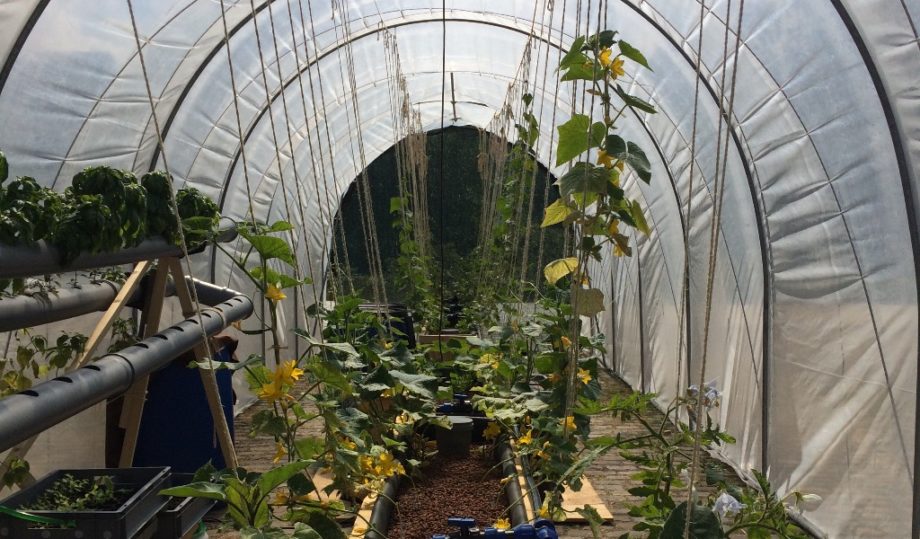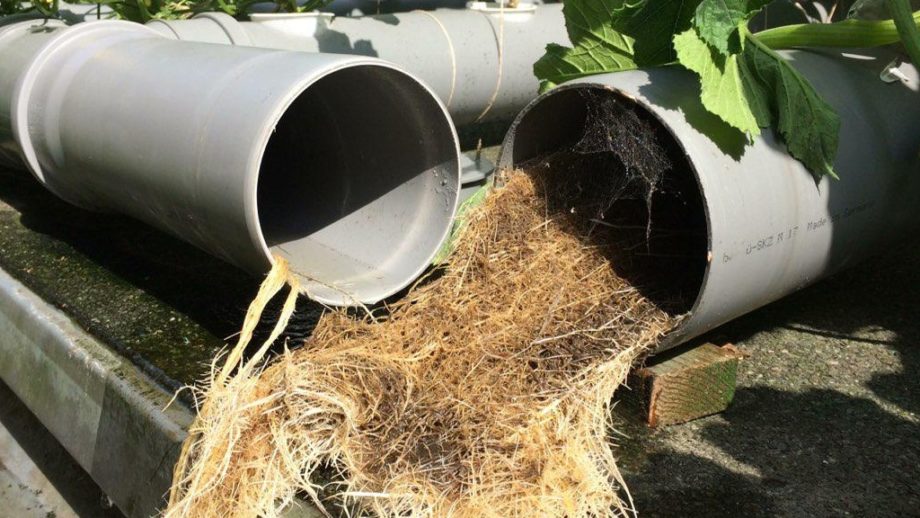More-than-human crises in more-than-human fields

Hydroponic of the Aquaponics facility in Bremen (Photo by the Author).
The focus of my research is on the complex relations between ecological sustainability and economic rationality using alternative food production as my empirical example. My subject is the study of; metabolic apparatuses in the Anthropocene. In my research the political ecology of aquaponics will be outlined.
I started my fieldwork in 2019 and was looking for a scholarship to finance my doctoral research. Then in 2020, the shock due to the spread of the SARS-CoV-2 (coronavirus)came. Fortunately, I found financial and content-related support even before the crisis broke out. It quickly became clear that my research would be very different from what I had initially planned. With the pandemic, a field is revealed that could have come straight from a science fiction novel. A global virus, rapid environmental changes, social riots, economic crises – an all-encompassing feeling of loss of control.
In my everyday life as well as in my work as ethnographer, I was confronted with crucial changes. Ethnography or cultural and social anthropology are primarily concerned with everyday situations. This „“everyday life” has of course changed significantly due to the SARS-CoV-2 (coronavirus)restrictions (Lems 2020). Nonetheless, I am cautious to describe the pandemic as a historical turning point. I am not a historian, but I have the feeling that we have been in a permanent state of crisis rather than a state of stability during the last years.
Many (but not all) phenomena and trajectories have already existed before the pandemic. Of course, I believe that the pandemic has had an impact on all our lives. And clearly, the space of everyday life has changed. However, I think that we should not forget that many people are living in permanent states of crisis. Nevertheless, the pandemic challenges a lot of “usual” perspectives. The situation revealed a variety of grievances that had not previously occurred in such a drastic manner. This applies both to my everyday life and to my research context. I think that the pandemic will have a strong impact on educational and research institutions and that they will be exposed to great uncertainty. As a young researcher, this uncertainty still applies to me to a certain degree. I wanted to participate in networks at the university as quickly as possible and to offer classes myself.
My ambiguous fieldwork
My thesis deals with the complex relationships between technology, biology, politics, economy, i.e. the assemblage of society. More precisely, my project is about the political ecology of socio-technical metabolic apparatuses within food production. For this, I examine the metabolic processes (social, political, economic, and biological) of aquaponics. Aquaponics is an experimental field that tries to use “natural” metabolic processes for sustainable food production by combining hydroponics with aquacultures. The excrement of fish is converted into nutrients through technical mediation, which are then supplied to the plants. For this, I originally wanted to analyze two fields. The first field is an aquaponics farm that is currently being set up in Bremen. The second field should have been an aquaponics farm in Namibia, located between Swakopmund and Windhoek.
I was very lucky, in some cases. I have known the people in my field in Bremen for years and have been working with them for a long time. With some minor restrictions, I was able to continue my research. Despite the difficult situation, the project in Bremen made significant progress. I was able to conduct interviews and be part of the construction of the aquaponics facility. Thus, I could use the “classic” ethnographic toolkit. However, eventually the intimacy and randomness of field work was missing. It seemed that the more uncertain the field, the better the organization had to be. Practically, it meant that some contacts broke off, that I had to postpone some appointments and that I had to construct new forms of participatory observation. So, I spoke with fewer people, but much more intensively. Even though I had the chance to do research in the field, I still had to adapt my approaches. Methodologically, I had to think about what this so-called field actually consists of.
However, the question arose to what extent „mainstream“ methods are still effective in times of uncertainty and contingency. Once again, I became aware that research categories and methods develop in the course of research. Particularly, in times of crisis there are shifts in perspective. My project requires a multidisciplinary approach anyways. For this, methods that are not necessarily anthropological must also be used or at least be considered. The understanding of biological processes, of supply chains, and of technical interrelationships is fundamentally important in order to understand more-than-human metabolistic practices.
The pandemic had far more severe consequences with regard to my second field site. The aquaponics project in Namibia was temporarily canceled because the investors themselves had to struggle for their existence. In any case, entry into Namibia was impossible given the situation. These circumstances made me even more aware of what privileges I have as a white, Central European researcher. Although I had already thought about my position as a researcher with regard to Namibia’s colonial past, the travel restrictions only made me more aware of how complex the reflections about fieldwork can and must be. Nevertheless, I think it is important to also consider the global aspects of local food production in Namibia.
In summary, my research has been greatly transformed in the face of the global pandemic crisis. I had to deal with adjustment of my approach – both on a practical research level and on a theoretical level. Some fields and issues have to be shifted, but others have emerged. For me, it simply shows that it is of enormous importance to remain flexible, especially when confronted with global crises.

The hydroponic of the aquaponics facility in Bremen. (Photo by the Watertuun).
More-than-human agencies
The onset of crisis only increases the urgency to think about more-than-human processes, as they do not only have a theoretical influence on the way society works but also hold a form of agency. The events of the Covid-19 crisis directly affect our research and living practices. Specifically, the current pandemic situation shows how non-human processes and politics are interwoven. Basically, my work aims to contribute to this entanglement. Dealing with food production as an example of bio-social interdependencies is different from being concerned with the functioning and consequences of viruses. While a simple translation would be presumptuous, there are parallels at least concerning the meaning of bio-social relations. In view of global crises, it can become very important to deal with food production and food security. The recognition of non-human activity plays can be observed in food production as well as in virus related politics. In this, two trajectories can be observed both in food production and in the handling of viruses. On the one hand, it is shown that bio-chemical processes influence policies. On the other hand, “natural” processes are affected by politics. My point here is that a constitutive process takes place that includes non-human agency.
No business as usual
Due to the current global pandemic, there are dramatic effects on life processes and world events, which would probably not have occurred in any other form. For ethnological researchers, obstacles appear which they faced less before the. However, this rupture is also an opportunity to reflect on the extent to which methods, methodologies, and theories need to be rethought, configured, and modified. Perhaps, we urgently need as Anna Tsing recently claimed new modes of “noticing” (2015: 21). Ethnographic research has the ability to adapt to difficult situations, it is in itself constantly changing, at least in my understanding of this kind of discipline.
We have to admit that there is no “business as usual” and the pandemic (among other crises) shows us in all clarity that it is not about bringing uncertainties under control, but rather about learning to “stay with the trouble” and to find ways to describe and analyze it (Haraway 2016).
Written on 04 October 2020 revised on 9 October 2020
Jan Bartsch has been a doctoral candidate of the Rosa Luxemburg Foundation in the field of political ecology since 2020. He is doing his doctorate at the Philipps-University Marburg. Prior to this, he studied cultural and social anthropology in Marburg and political science in Bremen. His research is situated at the interface between science and technology studies, new materialism and political sociology. He is currently working on the interactions between ecological sustainability and economic production modes. Contact: jan.g.bartsch[at]gmail.com
References
Haraway, Donna. J. 2016. Staying with the Trouble. Making Kin in the Chthulucene. Durham and London: Duke University Press
Lems, Annika. 2020. The (Im)possibility of Ethnographic Research during Corona. https://www.eth.mpg.de/5478478/news-2020-06-11-01. Last access: 30.09.2020
Tsing, Anna. L. 2015. The Mushroom at the End of the World. On the Possibility of Life in Capitalist Ruins. Princeton and Oxford: Princeton University Press



























